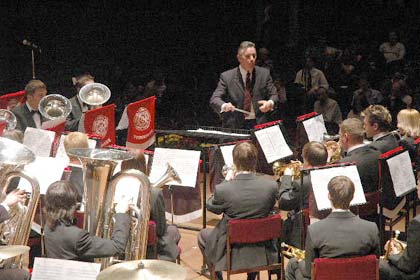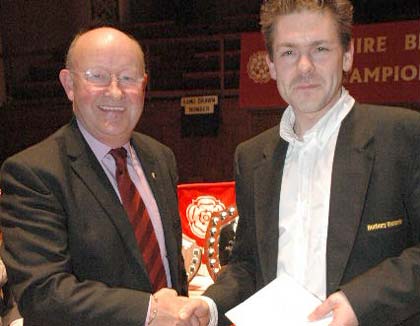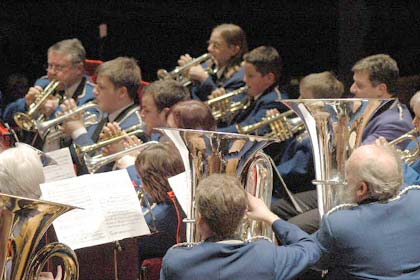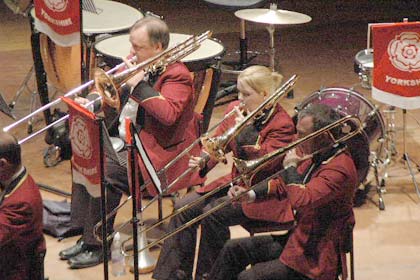2006 Yorkshire Regional Championships - Third Section retrospective
9-Mar-2006Entertainments certainly proved to be one heck of a test in the Third Section, and so it proved as Vinter's great old work took plenty of casualities along its way.
Sunday's pre Championship Section taster it has to be said was a real disappointment in the quality of performances on offer from a piece that on the evidence here could prove to be just as difficult to play as Howard Snell's ‘Images of the Millennium'.
The chances are that bands in the Midlands, North West and Scotland will be up for the challenge this forthcoming weekend, but how many performances of real merit will be given remains to be seen.

Walkers Way - Bob Walker leads Horbury to Harrogate
Vinter's ‘Entertainments' isn't easy at all (it would provide a challenging test for the Second Section bands) and it's worth noting that it actually started out as an orchestral string work. If truth be told it is a work that could be played by a competent Third Section band, but it is a work that needs a competent and knowledgeable MD to direct it successfully as well. The other slightly surreal thing to note was after the Elegy those of us of a certain age were just waiting for the start of ‘Spectrum' as memories of the old Black Dyke record with Jimmy Shepherd came flooding back.
All of the bands on the day have to be commended for having a go, and hopefully none of them came off stage disappointed. Howver, many of the problems they encountered here on the piece were all rather self inflicted – usually by the MDs.
Many of the bands in this section in Bradford were full of young players and were being stretched to their limits at times technically and musically, but with that in mind, the conductors had to realise that too and make amends accordingly.
The opening for instance to the Caprice is marked Con Brio; crotchet = 128 approx. That should have allowed them to just take the foot off the gas to enable the euph to play the tricky semi quaver work with clarity and style. Too many of course went for speed (128 is the perfect speed in fact) and the consequences were at times dire.
There were also problems with some very basic technical matters too. The grace notes in the opening movement are not on the beat, as many played them, yet those in the final movement are – as many didn't play them, whilst the final bar contains just a subtle accent and not a great big smash on the head. Also, it is on the first quaver and not the last.
There were plenty of these little things that were disappointedly missed by far too many MDs on the day, and although we appreciate that at this level the basics are the first things to be mastered, these were pretty basic things in themselves.
Adjudicator Chris Houlding clearly enjoyed himself though. Speaking on behalf of himself and co-judge Barry Thompson, Chris raised the point about intonation, the standard of ensemble playing, and the sound quality of the bands and commented on the direction that had been projected from the MDs in the middle. All of these were fair and honest assessments, and even though this was a hard ask of the bands here, it seems that most of the MDs had little real appreciation about the piece and its composer. What was possibly lacking the most though was the sense of wit in the outer movements he felt and the sense of rubato in the Elegy.
With this in mind Chris did make the point that every time he and Barry smiled in the box with delight, that smile was removed by lapses and by the sounds of it, whilst being honest in their comments, they offered plenty of encouragement. The performances of the bands in the slow movement were commended (where most bands opted for the Assistant Principal to play the melodic opening line) and the audience was informed that performances that came from Horbury Victoria, Clifton & Lightcliffe and Elland (the deserved prize winners) stood out, although the latter missed out on a trip to Harrogate in September.
Horbury Victoria and their MD Bob Walker captured the mood of the piece for definite and this clearly impressed the judges. It wasn't error free by any means, the opening ‘Caprice' wasn't great, but in fairness the band really did dig in and produced a final two movements that set them apart from the other bands. The band's principal cornet player Graham Franks in particular demonstrated enough quality to take the solo prize, even though he has just been back from a three year break form playing and had only been back in practice for 6 weeks!

Franks alot - Horbury's cornet player takes the soloists prize - after just six weeks practice!
Bob was obviously a delighted man when we spoke to him after the results and made sure that he thanked his players for their efforts. What was troubling him though was the thought of explaining to his wife that he had to cancel the 30th wedding anniversary holiday to Australia to conduct at the National Finals.
Clifton & Lightcliffe under John Clay took the other qualification place and like Horbury they didn't start too well either (the euphonium survived by the skin of his teeth). 
Clifton suspension - Clifton join together bridge the gap to Harrogate
They recovered sufficiently to give a commendable effort with some fine cornet playing in the middle movement (which had a fine sense of shape with just the right degree of crescendo and diminuendo over the two bars phrases as marked) helping them on their way to second place and a trip to the Finals.
Morgan Griffiths led Elland Silver's challenge from the number two draw and this was a fine display that was always likely to feature. With ex YBS player Helen Robinson in the cornet ranks, Morgan conducted his troops with a real sense of authority and clear direction and this element was a key factor into their placing.

To Elland back - but not quite Harrogate for Morgan Griffith and his band
The opening movement was a fine effort and although the solo cornet wobbled a touch in the elegy, the final march section was arguably the best of the day with some fine dynamics. If they'd played in the first two movements as they did in the final one, then they would surely have qualified but it wasn't to be.
If the first three bands had a sense of distinction about them, it's fair to say that Gawthorpe Brass '85 performed with merit. Ok, it wasn't a top three show, but it had moments and was well directed by John Edward. Just when it could have pushed for a higher placing the last movement cost them more dearly than most and they somewhat ran out of steam on the final reprise.
Garforth Brass was short-listed in 2005 by 4BR for our ‘Newcomer of the Year Award' and this young band has to be commended for their efforts. They gave it everything, never giving up and playing like their lives depended upon it at times – the percussion player was so keen he came in too early, and they'll learn from glitches like that. Steven Bailey didn't stop smiling and encouraging his troops, even in those dodgy moments when things were not quite going to plan. There is a whole raft of talented young players in this band that they will just keep improving and improving we are sure.
Gawthorpe Brass and Huddersfield Brass were two bands who just found the music too difficult to produce a performance that would make a serious impression on the judges but it was good to see the conductor of Maltby Miners Welfare give a comforting word to his soprano player at the end of her performance. The young lady didn't enjoy the experience at all, and seemed in awe of the part before her. The MD knew it though and whilst Maltby looked happy to leave the stage they have to be credited for competing and giving it their best. They will return the better for it we hope. Gawthorpe Brass also had their struggles, but again these tended to stem from the fact that the tempos were perhaps a bit too generous in the first and third movements and a bit less so in the demanding ‘Elegy'. Still, a band with lots of talent and plenty to work on for next year. Huddersfield too will look back at this outing as a part of a very steep learning curve and perhaps the tempos once again were a bit ambitious in the outer movements.
That goes for Armthorpe Elmfield who didn't look to be enjoying the experience and will hope for better times when they next compete. There is promise in the ranks here and plenty of experience at the helm in Haydn Griffiths, but they will return once more we are sure.
The bands get the thumbs up though from us for having a go at a difficult piece that on the evidence of this first regional, may be a very tough test indeed.
Malcolm Wood and Iwan Fox















